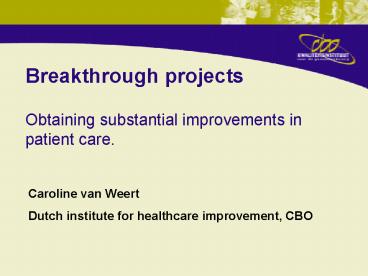Breakthrough projects Obtaining substantial improvements in patient care' - PowerPoint PPT Presentation
1 / 19
Title:
Breakthrough projects Obtaining substantial improvements in patient care'
Description:
We support, they do the work, To attain substantial and ... orthopaedic knee 9. 2002. Stroke service transmural 14. 2003. Stroke service transmural (2) 9 ... – PowerPoint PPT presentation
Number of Views:43
Avg rating:3.0/5.0
Title: Breakthrough projects Obtaining substantial improvements in patient care'
1
Breakthrough projects Obtaining substantial
improvements in patient care.
- Caroline van Weert
- Dutch institute for healthcare improvement, CBO
2
DUTCH INSTITUTE FOR HEALTHCARE IMPROVEMENT, CBO
- Not for profit,
- Non governmental,
- Hospitals participate voluntarily,
- We support, they do the work,
- To attain substantial and lasting improvements in
patient care, - In cooperation with patient groups,
- By supporting healthcare providers - professional
s, - healthcare organizations, - Founded by professionals and hospitals, 25yr ago.
3
Improvement in patient care
- We know what to doguidelines and best practices
- It is hard to put in practice
4
RESISTANCE TO CHANGE !
5
Breakthrough program is
- Effective and
- Enjoyable
6
5 yr. BT gt200 participants, 80 hospitals
- 2000
- Adult Intensive care 9
- Delay in Emergency 9
- 2001
- Adult Intensive Care (2) 14
- Delay in Emergency (2) 9
- Medication safety 12
- Postoperative infections 9
- Wait and delay on outboardfor diabetic feed
andorthopaedic knee 9
- 2002
- Stroke service transmural 14
- 2003
- Stroke service transmural (2) 9
- Advance access outboard, 13
- Medication Safety 12
- Postoperative infections 12
- Triage on Emergency 16
- COPD 9
- 2004
- Diabetes transmural,Mammacare (2) and Heart
failure
7
(No Transcript)
8
What is Breakthrough?
- In a BT collaborative several teams from
different organizations form a temporary
collaborativethey strive at ambitious
improvements in patient care through the
implementation of existing knowledge and best
practices.
9
Breakthrough, what makes it work ?
- Focus on the system
- Lack of knowledge is most of the cases not a
crucial factor but to make it happenshort span
of time,facilitate - Peer experts
- Setting the goals in results
- not invented by me
- Multidisciplinary approach teamwork
- Competition, social pressure the spotlight
- Make progress visible, feedback
10
Breakthrough, the model
Participants
Prework
Select Topic
Pre-session
Change Concepts Priorities
P
A
P
A
P
A
D
S
D
S
D
S
Expert Group
LS 3
Follow up
LS 1
LS 2
Supports E-mail Extranet Visits Assessments
One Page Reports
11
The Rapid Cycle Improvement Model (Nolan)First
step three questions
1.What are we trying to accomplish? (AIM)
2.How do we know that a change is an
improvement? (MEASUREMENT)
3. What changes will result in an improvement?
(INTERVENTIONS)
12
When you want to built a ship, dont ask people
to get wood and nails, to plan and make
schedules, but teach them to long for the endless
sea (Antoine de Saint-Exupéry)
13
Smart Goal setting
- Not better care
- Not less pain after operation, but
- 85 of patients first 24 hrs. after operation,do
have a pain score lt 4 (VAS)we reach before nov.
2005 (current 35 lt 4)
14
The Rapid Cycle Improvement ModelNext step
three ore more times the cycle
again and again
plan
act
study
do
15
Try, try and try
- Pitfalls
- Too academic approach (plan only)
- No feedback on results,
- Discuss with people thinking otherwise.Most
times it helps you to understand (check) - Try again, differently
16
Planning, participants perspective
- Nov. 2003 mailing
- Jan. 2004 information sessions
- Febr. Intake
- April. Pre-session
- June 1st 2 day learning conference
- Nov. 2cd learning conference
- April 2005 3th learning conference
17
It can be done reduce hospital stay
(Eindhoven)Goal 1-6-03 median stay is 14 days
Actions taken protocol criteria, registration,
no selection, planning capacity
18
10 succesfactors (as far as we know)
- Evidence combined with best practices
- Learning with peers
- Selfmanagement
- Setting clear aims measures
- Exchange of results
- Monitoring, timepress., competition
- Teamwork
- Commitment of management
- Involvement of clinicians
- Time, money, people
19
Further reading
- www.ihi.org and www.cbo.nl
- Paul Rasch, p.rasch_at_cbo.nl
- Stan Janssen, s.janssen_at_cbo.nl
- Dutch institute for healthcare improvement, CBO
- Lets Breakthrough together in Europe !
20
Score1 non-starter2 activity but no change
3 modest improvement4 significant
improvement5 benchmark
Outcome assessment
39
15
13
2
ED 1, 2 ICU 1, 2 Medication safety, POWI, Flow
Score at LS 3 (after six months)































